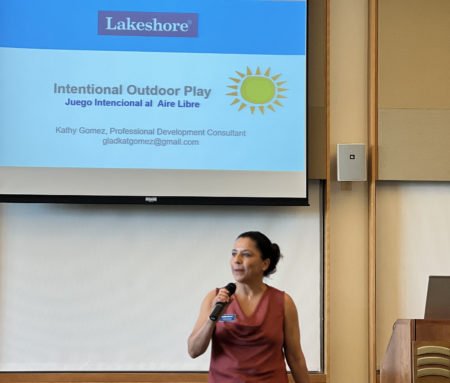The Importance of Intentional Play in Early Development
There is often an incorrect assumption that play has no purpose but to expel energy. However, extensive research has proven how key the act of play throughout life truly is - from early development to adulthood.YWCA Metropolitan Chicago collaborated with longtime partner, Lakeshore Learning, on Outdoor Adventures: Intentional Outdoor Play. The event was hosted at the University Center of Lake County and open to parents/guardians and providers. More than 80 attendees joined us on an early Saturday morning to dive deeper into the science of play and activities for children that could be implemented immediately, now that we've moved into summer months.Did you know that the origin of kindergartens was based on outdoor education?

Our presenter, Kathy Gomez, has been in the field for more than 30 years and conducts preschool through school age classroom observations. The bilingual training dynamically bounced between theory overviews and discussions on current classroom approaches. Just like May's Spring Symposium, those early in their education career and seasoned teachers filled the room - some being home-based providers and others part on of a large center team.The air was filled with a deep sense of curiosity and excitement of what could be brought back to their own children. As breakout group discussions were held, Kathy would always ask participants to not only think back on what is done in their current curriculum, but what inspired their play as a child personally. "Once a teacher, always a student" was the theme of the morning.Here are some thought-provoking facts shared:
- It takes 25-30 years for the brain to fully develop, per recent brain science. 80% is done by age 3 and 90% by age 5. It’s the prefrontal cortex that takes the longest.
- A baby’s brain doubles in size in just a year—communicating constantly is a big help and really matters even when it seems like they are too young to take anything in.
- Around age 3 is when it starts becoming possible for children to regulate their emotions.
- “You need 8 hugs a day to function and 12 a day to thrive.”
- Play is the only activity that touches on all neurotransmitters—dopamine, serotonin, oxytocin, norepinephrine, GABA, and endorphins.
So empowered with all of this knowledge, what can we do in the early learning environment - be that a home or center - to make play a prosperous factor in our children's lives?
- Understanding that children take in play in different ways means noting what stages they tend to stay in are important so educators can help to increase areas of gray. Diagnoses, family dynamics/exposure, and character traits also impact this.
- Teach using your body to help communicate to children and encourage their interest in natural exploration in all sorts of environments.
- There’s an art to teachers acting as a facilitator for children as they are playing—you don’t want to dictate, but instead provide open-ended questions to guide them on a journey.
- Figure out how to bring those indoor activities outside to increase the environmental stimulations. Think about the actual material makeup of the supplies you are using in terms of what’s outdoor-safe/friendly.
Use the simple items you have at home and watch those young minds come to life. That's what all of these points go back to.Lakeshore Learning ended the day by donating an implementation kit of outdoor toys for every provider in attendance. We are so grateful for this meaningful gift and a fantastic workshop.
